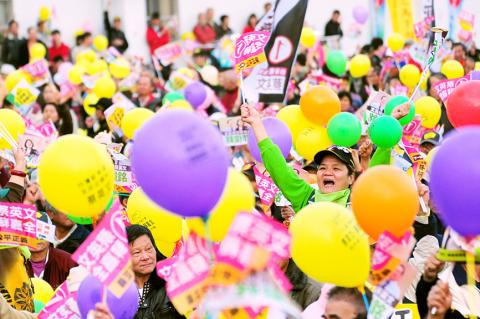Democratic Progressive Party (DPP) presidential candidate Tsai Ing-wen (蔡英文) last night wrapped up “Super Weekend” ahead of Saturday’s presidential election with two large rallies in the north, saying that she is confident the party is inching closer to victory.
Tsai kicked off the weekend in her hometown in Pingtung County on Saturday and traveled through southern, central and northern parts of the country, canvassing the streets during the day and organizing six large rallies at night, hoping to consolidate voter support.
The DPP campaign received a boost of confidence from -enthusiastic support for Tsai’s motorcade, which traversed the DPP strongholds of Greater Tainan and Greater Kaohsiung. Campaign aides said turnout was solid, with 100,000 rally participants in Greater Tainan and 20,000 in Lujhu (路竹), Greater Kaohsiung, on Saturday; while yesterday 30,000 turned out in Fengyuan (豐原), Greater Taichung, and -Yuanlin (員林), Changhua County; and 150,000 in Taipei.

Photo: Liao Yau-tung, Taipei Times
Tsai began yesterday morning by crossing Greater Tainan by motorcade, before staging two rallies in central Taiwan in the afternoon and two more rallies in the north at night.
Speaking in Fengyuan, the DPP chairperson said she recognized the pivotal role that central Taiwan would play in the election, calling the region “the most crucial constituency in the nation” and said she hoped to secure more than half of the votes there.
In a speech yesterday morning in Greater Tainan, Tsai reiterated that her administration would do its best to advance consociational democracy and a grand coalition government — which would mean that “the premier would not necessarily be a DPP member” — by launching party-to-party talks.
She added she would also work with the new legislature and its new speaker, scheduled to be sworn in on Feb. 1, to review the national budget and to cut back on meaningless, inefficient and overspending projects.
The DPP also focused on countering what it said were improper campaign strategies that were used by the Chinese Nationalist Party’s (KMT) over the weekend, such as illegal mobilization, breach of administrative neutrality, potential vote-buying and the playing of the “stability card.”
While President Ma Ying-jeou (馬英九), seeking re-election for the KMT, repeated that stability would be lost without the so-called “1992 consensus” and a change of regime, Tsai said that was not the case and that Ma’s interpretation of stability was way off base.
“Stability means people wake up in the morning knowing that they have a job, have a house to live in when they get off work and can put food on the table,” Tsai said in Greater Tainan on Saturday, adding that for a lot of people, Ma has fallen short of this task.
“Stability also means a government which distributes its resources fairly and respects the legislature and the opposition, and Ma did not accomplish that either,” she said.
Most importantly, she added, stability is not enough to sustain a society without consensus, which was why she advocates the formulation of a “Taiwan consensus.”
“Instability would not happen because of the lack of the ‘1992 consensus,’ but it would because of the lack of a democratic process that does not consult people’s opinion,” Tsai said.

The CIA has a message for Chinese government officials worried about their place in Chinese President Xi Jinping’s (習近平) government: Come work with us. The agency released two Mandarin-language videos on social media on Thursday inviting disgruntled officials to contact the CIA. The recruitment videos posted on YouTube and X racked up more than 5 million views combined in their first day. The outreach comes as CIA Director John Ratcliffe has vowed to boost the agency’s use of intelligence from human sources and its focus on China, which has recently targeted US officials with its own espionage operations. The videos are “aimed at

STEADFAST FRIEND: The bills encourage increased Taiwan-US engagement and address China’s distortion of UN Resolution 2758 to isolate Taiwan internationally The Presidential Office yesterday thanked the US House of Representatives for unanimously passing two Taiwan-related bills highlighting its solid support for Taiwan’s democracy and global participation, and for deepening bilateral relations. One of the bills, the Taiwan Assurance Implementation Act, requires the US Department of State to periodically review its guidelines for engagement with Taiwan, and report to the US Congress on the guidelines and plans to lift self-imposed limitations on US-Taiwan engagement. The other bill is the Taiwan International Solidarity Act, which clarifies that UN Resolution 2758 does not address the issue of the representation of Taiwan or its people in

US Indo-Pacific Commander Admiral Samuel Paparo on Friday expressed concern over the rate at which China is diversifying its military exercises, the Financial Times (FT) reported on Saturday. “The rates of change on the depth and breadth of their exercises is the one non-linear effect that I’ve seen in the last year that wakes me up at night or keeps me up at night,” Paparo was quoted by FT as saying while attending the annual Sedona Forum at the McCain Institute in Arizona. Paparo also expressed concern over the speed with which China was expanding its military. While the US

SHIFT: Taiwan’s better-than-expected first-quarter GDP and signs of weakness in the US have driven global capital back to emerging markets, the central bank head said The central bank yesterday blamed market speculation for the steep rise in the local currency, and urged exporters and financial institutions to stay calm and stop panic sell-offs to avoid hurting their own profitability. The nation’s top monetary policymaker said that it would step in, if necessary, to maintain order and stability in the foreign exchange market. The remarks came as the NT dollar yesterday closed up NT$0.919 to NT$30.145 against the US dollar in Taipei trading, after rising as high as NT$29.59 in intraday trading. The local currency has surged 5.85 percent against the greenback over the past two sessions, central